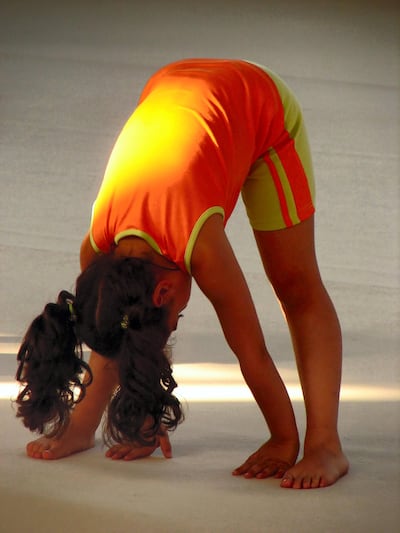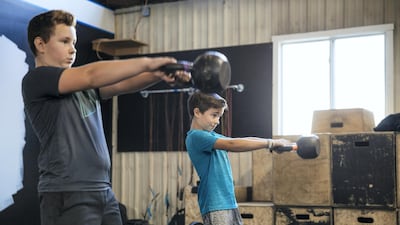We all know how important it is for children to lead an active life. But at what age should juvenile games and school sports teams make way for a more structured and serious kind of fitness regime?
Weight training and gym time might not be routines that most parents consider when thinking about keeping their children active, but they don't have to be completely off limits. Introducing strength and resistance training from a young age may help with sport performance, say some experts, as well as benefit other areas of children's lives.
Myth: weightlifting fuses the bone plate
“A lot of people fall into the trap of thinking that weight training is bad for children,” says Nick Mitchell, founder and global chief executive of Ultimate Performance, which has a gym in Dubai. “They used to say that weight training would fuse the bone plates that are required to stay open for growth – this is utter rubbish. It’s a myth.”
Mitchell is one of the world's foremost authorities on body composition and author of Your Ultimate Body Transformation Plan. He also has a 10-year-old son and eight-year-old daughter. His theory is that the traditional physical activities most children engage in – running, sprinting, leaping, somersaulting and falling – can put just as much strain on their body as controlled weightlifting.
There have been numerous studies looking into the benefits of weight and resistance training among tweenagers. In one, children between the ages of 10 and 12 were introduced to basic Olympic-style lifting and plyometric exercises. The kids took a fitness test before and after training; the results showed that those who did weight training exhibited significant improvement in sports such as horizontal jump, balance and 20-metre sprints.

In a second study, boys of eight and nine incorporated exercises such as sprints, squat jumps and weighted jumps into their regular football training. Their progress was compared to a controlled group that continued with regular football training. At the end of the six-week trial, those who had been strength training showed greater power, flexibility and endurance.
Lauren Moreira is one parent putting these theories into practice with her own children. The Brazilian jiu-jitsu trainer who lives in Abu Dhabi, decided to start her sons, who are 13 and 14, on a strength-training programme after seeing the benefits that lifting weights had on her own life when she started training at boutique gym Elite Fitness last year.
"I saw my results, so that's what really got me thinking: 'Hey, this is something everyone should do,'" she says. "[My sons] started training just about a year ago with me and, honestly, if I could have started them earlier, I would have."
The reason she did not was because she was one of those people who, as Mitchell put it, fell into the trap of believing that weight and strength training is not good for children. “I’ve now learnt it’s actually beneficial,” she says. “It can help strengthen the bones, connective tissues and muscles surrounding the joints, and that’s all beneficial to help support children in their daily lives or their athletic sport. They just need the proper guidance.”
Following instructions a must
It's also important that starting any kind of strength training with a child be their choice. "I wouldn't have children [lifting] weights until they are old enough to want to do it and to appreciate a formal routine," says Mitchell. "My son is 10. Obviously he has been heavily influenced by me. But he's still not quite at that stage where he wants to take on a formal training programme."
Enforcing an exercise routine on a child is likely to make them see it as a chore. “This is the very last thing we want children to think about with exercise and fitness,” Mitchell says. “We want it to be something that they look forward to ... a daily reward – getting the chance to get outside, play, have fun and do some exercise.”
He says that if his son is interested, he will think about starting his training when he turns 11 or 12. "They can start weight training at any age, really," he says. "But very young children are very rarely going to take instruction in a focused manner to learn movements safely. So, I wouldn't be having an eight-year-old doing a bench press."
He adds that, regardless of age, the first thing to have any child do is master their own body weight. “[It] will have the greatest carry-over for them in every other sporting endeavour that they might wish to pursue.”
Moreira's children weight train during school holidays and breaks from other athletic commitments, and she says not only has their performance in their sports improved, but they also feel confident and stronger in other areas of their lives. "I can't say that they enjoyed it right off the bat," she admits. "It's not easy, but it's just like with anything – after they become good at it, they enjoy it more. Then, when they start to see how it benefits them in other areas, they begin to want to do it more."
Yoga for children
Sports such as yoga and Pilates also build body strength, and can be a good way to introduce children to a more focused workout. Bodytree Studio in Abu Dhabi has launched a youth well-being programme, with a number of specialised yoga classes and workshops aimed at those between the ages of 13 and 19. "The programme is designed to bolster academics, physical practice and skill sets by providing students with an outlet to manage their health in a fun atmosphere," says Bodytree owner Sharifa Sehweil.
Bodytree is not only hoping to supplement the physical education of children in the capital, but it believes the programme will have a mental impact, too. "With anxiety, depression and suicide rates on the rise, we are striving to build a better understanding of mindfulness and well-being, diverting the need to start buying into fad products and diets, which are heavily promoted by celebrities and influencers," Sehweil says.
Both Sehweil and Mitchell agree that the most important thing when it comes to children’s health is instilling good habits from a young age, whether that’s around being active, eating well or being able to deal with their self-image in a positive manner. “Regular physical activity for your child is essential from an age as early as one year old,” Sehweil adds. “If the habit is instilled at a young age, your child is likely to continue participating in physical activities without complaint for the rest of their lives.”
Top tips for introducing children to strength training
Make a plan. It's important to get some guidance from a professional before starting any kind of strength-training plan. A coach or trainer can create a programme based on your child's age, skills, size and interests that is both safe and enjoyable.
Remember to stretch. Any child or young person doing weight or strength training needs to make sure their muscles prepare and recover properly. It is important to perform a proper warm-up with some light aerobics, and a full muscle stretch to cool down.
Start things light. Children should be introduced to weight training gradually. Start with body weight or resistance bands, before moving on to light weights. To begin, one to two sets of 15 reps is more than enough. It's also important to mix exercises up to keep things fun and interesting.
Get the technique right. A proper technique is essential for all weight training. Ensure the child is supervised at all times when they are lifting weights; that way, you can keep an eye on technique to ensure there are no injuries.
Make time for rest. No child should be weight training every day. Their muscles are still growing and developing, and there needs to be plenty of recovery time between workouts. One to three sessions of weight or strength exercises each week is enough.




